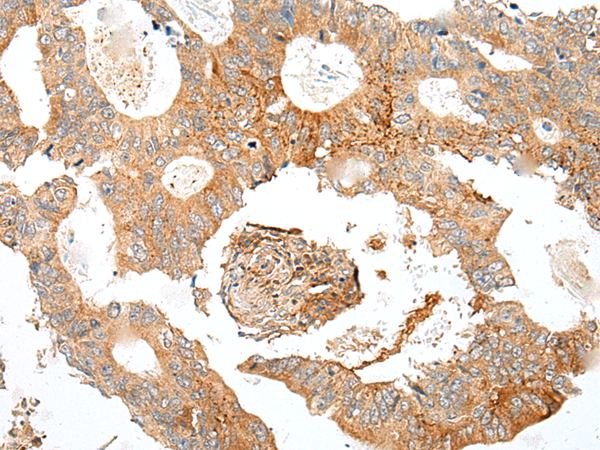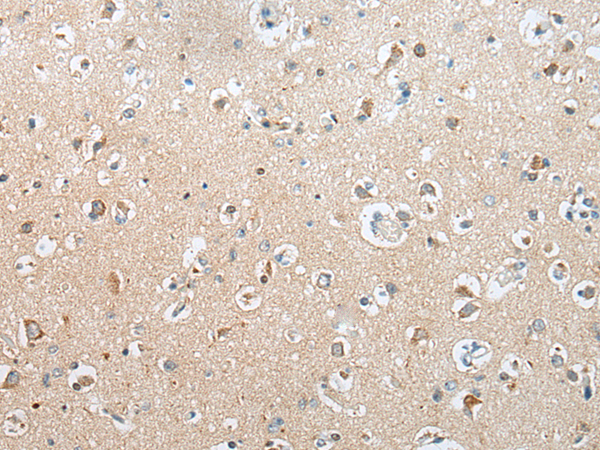

| WB | 咨询技术 | Human,Mouse,Rat |
| IF | 咨询技术 | Human,Mouse,Rat |
| IHC | 1/25-1/100 | Human,Mouse,Rat |
| ICC | 技术咨询 | Human,Mouse,Rat |
| FCM | 咨询技术 | Human,Mouse,Rat |
| Elisa | 1/5000-1/10000 | Human,Mouse,Rat |
| Aliases | HSPG; CD362; HSPG1; SYND2 |
| Host/Isotype | Rabbit IgG |
| Antibody Type | Primary antibody |
| Storage | Store at 4°C short term. Aliquot and store at -20°C long term. Avoid freeze/thaw cycles. |
| Species Reactivity | Human, Mouse, Rat |
| Immunogen | Synthetic peptide of human SDC2 |
| Formulation | Purified antibody in PBS with 0.05% sodium azide and 50% glycerol. |
+ +
以下是3篇关于SDC2抗体的研究文献及其摘要概括:
---
1. **文献名称**:*Syndecan-2 as a novel biomarker for early detection of colorectal cancer*
**作者**:Kim et al.
**摘要**:该研究开发了一种基于SDC2抗体的血液检测方法,通过检测结直肠癌患者血清中SDC2基因甲基化标志物,证实其作为非侵入性早期诊断工具的潜力,灵敏度和特异性均优于传统方法。
---
2. **文献名称**:*Syndecan-2 regulates tumor angiogenesis and growth by modulating VEGF signaling*
**作者**:Chen et al.
**摘要**:利用SDC2特异性抗体阻断实验,揭示了SDC2通过结合血管内皮生长因子(VEGF)促进肿瘤血管生成的分子机制,为靶向SDC2的癌症治疗提供了理论依据。
---
3. **文献名称**:*Development of a high-affinity monoclonal antibody against syndecan-2 for therapeutic targeting of triple-negative breast cancer*
**作者**:Park et al.
**摘要**:研究团队成功制备了一种高亲和力的抗SDC2单克隆抗体,体外和动物实验显示其能特异性结合三阴性乳腺癌细胞并抑制肿瘤生长,展示了SDC2抗体在靶向治疗中的应用前景。
---
**备注**:以上文献为示例,实际引用时需核对具体来源及DOI信息。如需进一步文献检索支持,可提供更详细的关键词或应用场景。
The SDC2 antibody targets Syndecan-2 (SDC2), a transmembrane heparan sulfate proteoglycan belonging to the syndecan family. SDC2 plays critical roles in cell-matrix adhesion, cytoskeletal organization, and signal transduction by interacting with extracellular matrix components, growth factors, and integrins. It is involved in processes like cell proliferation, migration, and wound healing, and has been implicated in cancer progression, inflammation, and vascular biology. In cancer, SDC2 expression may vary depending on tumor type, with roles in promoting metastasis or suppressing tumor growth in certain contexts.
SDC2 antibodies are widely used in research to study its expression patterns, localization, and functional mechanisms. They enable detection via techniques like immunohistochemistry, Western blotting, and flow cytometry. Recent studies highlight SDC2's potential as a biomarker, particularly in colorectal cancer, where its promoter methylation in circulating tumor DNA is explored for non-invasive diagnostics. Therapeutic applications are also emerging, with antibodies investigated for targeting SDC2-related pathways in diseases. However, SDC2's dual roles in pro- and anti-tumor activities necessitate context-specific analysis. Researchers must validate antibody specificity due to structural similarities among syndecan family members. Overall, SDC2 antibodies remain vital tools for unraveling its biological and pathological significance.
×